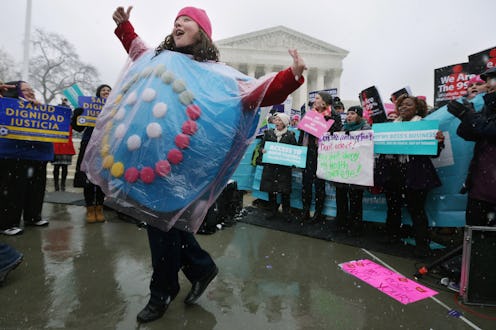News
Massachusetts Is About To Be The First State To Guarantee Copay-Free Birth Control

There's some uplifting news for people seeking robust reproductive health care in the Bay State. According to a statement released by the Planned Parenthood Action Fund as well as the Planned Parenthood Advocacy Fund of Massachusetts, Massachusetts is the first state to protect birth control access under the Trump administration.
The critical bill, known as ACCESS, was signed into law on Monday evening and pushed against Trump's gutting of contraception accessibility. According to Trump's policy, an employer would face virtually no legal consequences for denying birth control coverage to an employee for religious reasons. In addition to religious exemption, Trump's ruling would allow employers to cite "moral convictions" to hold back coverage.
But Massachusetts pushed back against the decision in a huge way when Republican Gov. Charlie Baker signed a bill guaranteeing a woman's right to birth control coverage.
This legislation will ensure no woman in Massachusetts, irrespective of what goes on in Washington, will worry about whether her health care services and rights will be affected here in the commonwealth.
Massachusetts' move can seen as the state's way of "protecting its residents," according to media relations manager of Planned Parenthood Massachusetts League, Johanna Kaiser. "This is a top priority for the state of Massachusetts to make sure that we are protecting our residents from the Trump administration's recent attacks on health care," Kaiser says. "That said, it should never be up to a state or a governor or a state legislator to have to protect their residents from the federal administration."
For other states, Massachusetts' approval of ACCESS could be inspiring but it seems like it will take monumental effort to pass similar bills across the country. "While we're really pleased and excited that we were able to protect Massachusetts' women and make sure they continue to have access to birth control, we recognize that there still are millions of women [across United States] that we need to make sure are protected," Kaiser says.
"I certainly hope," she adds, "[Massachusetts] sets an example for Washington to rollback these measures and to see how popular and necessary these protections are." In fact, ACCESS is supported by the Massachusetts Association of Health Plans, which comprises 17 insurance companies.
For women in Massachusetts, the law mandates that employers continue providing birth control to employees without citing any religious or moral grounds to deny it. It also adds an option for insurers to allow a full year of birth control coverage for those seeking it. And if you're looking for emergency birth control like Plan B, you can access it without a prescription.
Kaiser notes that the option of full-year birth control coverage would be a great advantage for women who work long hours and can't get to the pharmacy during the day.
Pro-choice advocacy organizations like NARAL, too, are excited by Massachusetts' ACCESS law, according to NARAL's national communications director, Kaylie Hanson Long. Long says that her organization's members "have been mobilizing for decades but especially this year, given all of the attacks that we have anticipated and seen coming from the Trump administration and the anti-choice Congress."
NARAL, according to Long, is working to "protect [and] expand" access to birth control in America where millions of women rely on birth control. According to a study by the National Survey of Family Growth, contraceptive pills in America aren't just used for preventing pregnancies; they also help regulate menstrual cycles, cramps, migraine prevention, and treat endometriosis.
With the bill signed into law, Massachusetts' ACCESS legislation can be seen as not only an inspiring move for other states to follow in terms of birth control access but also a loud and clear message to the Trump administration that some states will, regardless of federal policy, do their best to safeguard their locals.